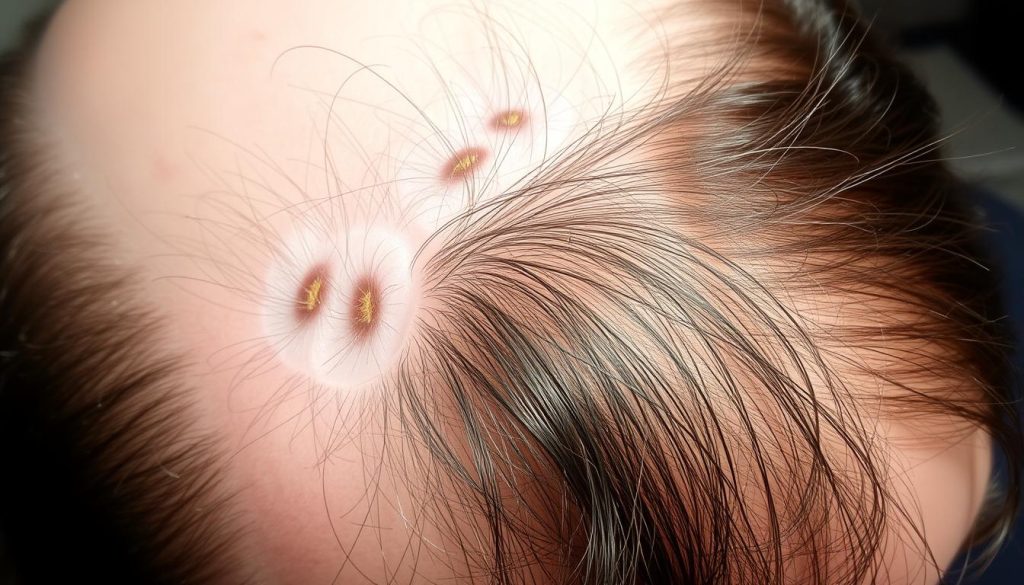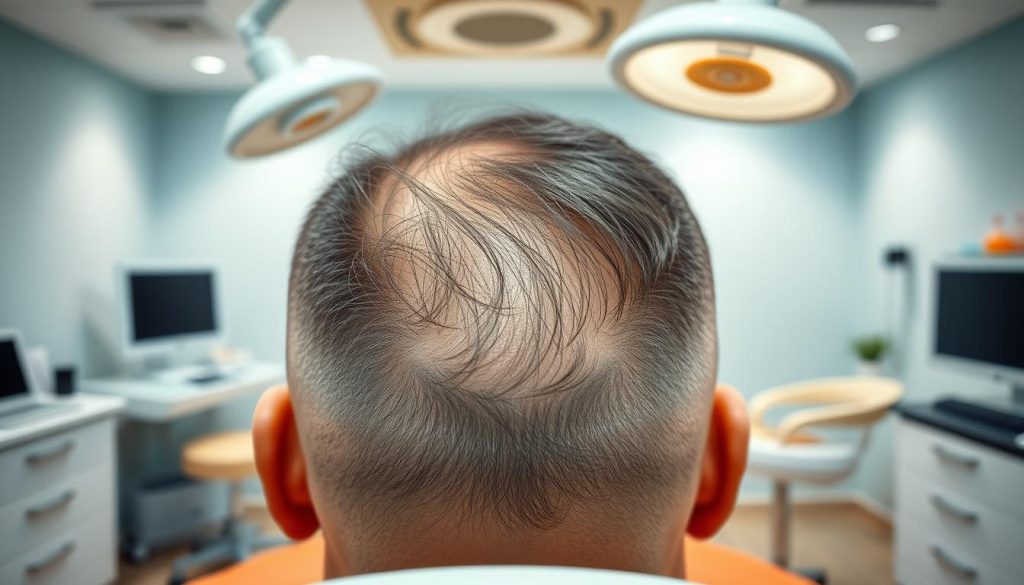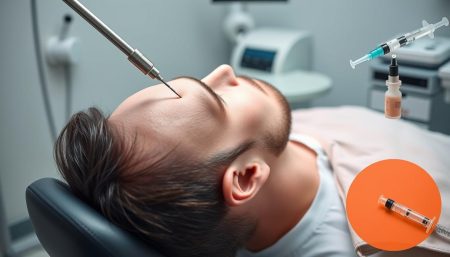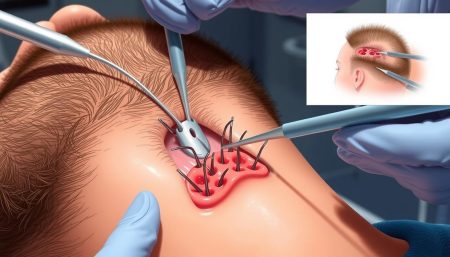Starting a journey with permanent hair restoration is a big step for those dealing with hair loss. Hair transplants are getting more popular. It’s important to know the good and bad, especially about long-term hair transplant results. This intro will cover the key points about hair transplant durability and what you can expect from this investment in your confidence.
A hair transplant aims to bring back lost hair. But, it’s important to remember that results can differ from person to person. The success of a full head of hair depends on many factors. We’ll go into these in detail, so you can make a well-informed choice about getting a hair transplant.
Key Takeaways
- Understanding the expected longevity of hair transplant procedures
- Recognizing factors that influence hair transplant durability
- Setting realistic expectations for permanent hair restoration
- Exploring avenues for maximizing and maintaining long-term hair transplant results
- Accepting the variance in individual hair transplant effectiveness
Understanding Hair Transplant Procedures
Exploring hair restoration means learning about hair transplant techniques. These methods move hair follicles from thick areas to thin ones. This offers a lasting fix for hair loss.
The Basics of Hair Transplant Surgery
Hair transplant surgery has evolved, offering natural-looking, long-lasting solutions. The success of a transplant depends on the techniques used.
The process starts with preparing the donor area, often the back of the scalp. Then, hair follicles are carefully taken out. These follicles are then placed in the thinning area for growth. This careful work boosts confidence and appearance.
Types of Hair Transplant Techniques
There are two main techniques: Follicular Unit Transplantation (FUT) and Follicular Unit Extraction (FUE). Each has its own way of working, affecting how long the transplant lasts and patient satisfaction.
- FUT: This method takes a strip of scalp, then extracts follicular units for the thinning areas. It’s efficient for covering large areas in fewer sessions.
- FUE: It directly takes follicles from the scalp without a strip. FUE is known for less scarring and quicker healing, great for those with short hair.
Both FUT and FUE are key for permanent hair restoration. The choice depends on hair loss, scalp, and aesthetic goals. Knowing these techniques helps in making informed decisions.
Looking for a big change in hair density or a better hairline? Modern hair transplant techniques offer lasting solutions. Choosing the right method and a skilled surgeon is crucial for success.
Factors Affecting Hair Transplant Longevity
The success and hair transplant longevity depend on many factors. Knowing these can help patients understand what to expect from their lifespan of hair grafts and results.
Several important longevity factors greatly impact a hair transplant’s success. These factors help grafts survive and look natural over time.
- Age and Health of the Patient: Younger, healthier patients often heal faster. This helps their transplanted hair last longer.
- Quality of the Donor Hair: The strength and thickness of donor hair matter a lot. Thicker hair usually leads to better results.
- Technique Used: The transplant method, like FUT or FUE, affects graft survival. The right method is key.
- Surgeon’s Skill and Experience: A skilled surgeon reduces graft damage. This is crucial for a successful transplant.
- Post-operative Care: Good care after surgery is essential. It helps grafts last longer by preventing infections.
Considering these factors is crucial for hair transplant longevity. It ensures patients get lasting results. New techniques and better aftercare are making hair transplants more successful.
How Long Do Hair Transplants Last?
Figuring out how long do hair transplants last is complex. It depends on the method, technology, and the person getting the transplant. Hair transplants are seen as a lasting fix for hair loss. The results depend on the method used and how well the person cares for their hair after the transplant.
There are two main ways to do hair transplants: FUSS and FUE. Both have long-lasting results, but doctors agree that most transplanted hair stays for a long time. Experts share detailed info on what to expect in the long run.
| Technique | Success Rate | Average Longevity |
|---|---|---|
| FUE | High | 20+ years |
| FUSS | High | 20+ years |
It’s important to note that hair transplants are expected to last a lifetime. But, some people might lose a bit of hair in the transplant area. This can be due to genetics, how well you care for your hair after the transplant, and your overall health.
Good post-op care and regular maintenance are key to lasting results. Going for regular check-ups and following your doctor’s advice helps keep your hair looking good for years.
In short, learning about how long do hair transplants last shows that with the right method and care, you can enjoy enduring hair transplant outcomes. Knowing this helps people set realistic goals and plan their care and maintenance.
Examining the Lifetime of Transplanted Hair
Understanding the lifetime of transplanted hair is key. The procedure offers a long-term fix, but results can vary. This part looks at what affects hair transplant durability and how hair ages over time.
The growth cycle of transplanted hair is vital for long-term hair transplant results. At first, the hair sheds, which is normal. Then, new hair starts growing from the transplanted follicles, usually in three to four months. It takes about a year to see the full effect.
To keep the results, it’s important to take good care of your hair. This includes regular treatments and proper maintenance.
- The genetic characteristics of the donor hair
- The patient’s overall health and scalp condition
- Post-transplant care and maintenance routines
With the right care, the lifetime of transplanted hair can be long. Regular check-ups with doctors help keep the long-term hair transplant results strong.
The Role of Donor Hair in Transplant Durability
The quality and characteristics of donor hair are key to a successful hair transplant. This part looks at how important donor hair is for the transplant durability and hair transplant longevity.
Characteristics of a Good Donor Site
A good donor site is usually at the back of the scalp. It needs certain qualities to make a hair transplant work well. These qualities help the transplant look natural and last longer.
- Density of Hair Follicles: The higher the density, the better the potential coverage in the transplant area.
- Hair Texture: Thicker hair strands provide more volume and coverage.
- Hair Color: Closer color match between donor and recipient areas ensures a natural blend.
- Scalp Elasticity: A flexible donor area allows for easier extraction and healthier grafts.
How Donor Hair Influences Longevity
The quality of donor hair greatly affects hair transplant longevity. Grafts from strong and healthy donor sites tend to do well and last longer. Knowing this helps both patients and surgeons choose the best hair transplant options.
| Factor | Impact on Transplant Durability |
|---|---|
| Follicle Health | Healthier follicles have a lower rate of failure post-transplant. |
| Donor Hair Density | Higher density leads to better initial coverage and durability. |
| Genetics | Genetic resilience to thinning and baldness prolongs transplant results. |
| Age of Donor | Younger donor hair tends to adapt and grow more effectively post-transplant. |
Choosing the right donor hair is crucial for transplant durability. It greatly improves the look and satisfaction of hair transplant patients.
Hair Transplant Maintenance for Optimal Longevity
To keep your hair transplant looking great for years, it’s key to follow a strong hair transplant maintenance plan after your surgery. Here are some tips to help you enjoy your results for a long time.
- Immediate Post-Operative Care: Right after surgery, it’s important to follow your doctor’s exact instructions. This usually means gently cleaning the area and using the medicines they gave you.
- Maintaining Hair Transplants Long-Term: After the first care, you need to keep up with long-term plans. Use mild shampoos, handle your hair carefully, and stay away from harsh chemicals to keep your transplants looking good.
- Healthy Lifestyle Choices: Eating well, drinking enough water, and not smoking can really help your hair and keep your hair transplants looking great.
- Follow-up Treatments: Regular visits to your hair transplant doctor are important. They can check on your scalp and hair health. They might suggest treatments like Platelet-Rich Plasma (PRP) therapy to help your hair grow thicker and fuller.

Remember, maintaining hair transplants is a big deal that needs both medical care and healthy living. By following these steps, you can make sure your hair transplant looks and feels great for a long time.
Common Myths About Hair Transplant Lifespan
Looking into hair transplant outcomes means clearing up common myths. These myths can confuse those thinking about hair restoration. It’s key to tackle these misconceptions and set clear expectations early on.
Busting the Myth of Lifelong Results
Many believe hair transplants last forever. But, modern methods offer long-term fixes, yet results depend on many factors. These include the patient’s health, lifestyle, and aging.
Knowing this helps set realistic hopes for hair transplant success.
Setting Realistic Expectations for Patients
Patients need to know what hair transplants can do. They can greatly boost your look and confidence. But, results vary due to personal traits and outside factors.
It’s about making the best possible outcome, not an impossible one.
Remember, hair transplants aim for a natural look that grows with you. This focus on natural aging helps meet realistic expectations. It leads to better, lasting results.
Navigating Through the Long-Term Hair Transplant Results
Thinking about a hair transplant? It’s key to know what to expect in the long run. Long-term hair transplant results are important for being happy with your choice. Over time, navigating transplant longevity is crucial for keeping your hair looking good and healthy.

Many things affect how well your hair transplant lasts. Genetics, how you live, and how you care for your scalp after the transplant are all important. Taking good care of your scalp can make your transplant last longer. Here’s what you can do to keep your hair looking great for years:
- Regular Scalp Care: Just like you take care of your natural hair, you need to look after your transplanted hair too. Use special shampoos and conditioners that help keep your scalp and hair strong.
- Protection Against Environmental Factors: Keeping your hair safe from the sun, pollution, and harsh chemicals is key. Wearing hats, scarves, and using gentle hair products can help a lot.
- Avoiding Harmful Styling Practices: Too much heat and styling can damage your transplanted hair, just like it can natural hair. Choose gentle styling methods to keep your hair healthy for a long time.
- Regular Check-Ups: Seeing a hair care specialist regularly is important. It lets you check on your transplant’s health and catch any problems early.
By taking good care of your hair transplant, you can have strong, healthy-looking hair for years. Remember, a hair transplant is a big investment in how you look and feel. Taking the time to care for it is worth it.
What to Expect During the Healing Process
Getting a hair transplant can change a person’s life if they’re losing their hair. The healing process is key to success. It includes careful aftercare and knowing when new hair will grow.
Immediate Aftercare and Its Effects
After a hair transplant, taking care of your scalp is very important. The first few weeks are sensitive and can swell. Your doctor will give you specific instructions to follow.
These might include gentle washing, avoiding harsh chemicals, and not doing too much. Following these steps helps your scalp heal better.
Timeline of Hair Growth After Transplantation
Every person’s recovery is different, but there’s a general timeline. You might see new hair growth in three to four months. But, it takes six to twelve months to see the full results.
During this time, you might lose some of the transplanted hair. This is called “shock loss.” But, it’s a normal part of healing. Soon, you’ll see new, healthy hair growing.
| Time After Surgery | Expected Milestones |
|---|---|
| 2-4 weeks | Scalp healing, possible temporary hair loss |
| 3-4 months | Initial signs of hair growth |
| 6-12 months | Significant hair development and thickening |
Knowing what to expect during healing helps with mental and emotional recovery. The aftercare tips and timeline guide you through the journey. They help you stay positive and focused on your hair restoration.
Sustainability of Hair Transplants: How Grafts Mature
The success of hair transplants depends on several key factors. These include the sustainability of hair transplants, the maturation of hair grafts, and the graft survival factors. Understanding these elements helps set realistic expectations for post-operative growth and longevity.
The Growth Cycles of Transplanted Follicles
After being transplanted, hair follicles go through several important phases. This cycle is vital for graft integration into their new home. It affects the long-term success of hair transplants.
First, there’s the ‘shock loss’ phase where hair falls out. Then comes the latency phase. Finally, the growth phase starts, where new hair begins to grow.
Factors That Support Graft Survival
Many factors contribute to hair graft survival beyond just surgery. Keeping the scalp clean and protecting it from too much sun are crucial. Genetic factors and overall health also play a big role.
This shows why a holistic approach to care is so important after surgery.

Teaching patients about these growth cycles and survival factors can greatly improve transplant success. Knowing the stages of maturation of hair grafts and the best conditions for graft survival prepares patients. It also helps ensure the best possible results.
| Phase | Duration | Key Activity |
|---|---|---|
| Shedding | 1-2 weeks | Initial loss of transplanted hair |
| Latency | 2-3 months | Lack of visible activity; follicles settle |
| Growth | 3-6 months and ongoing | New hair growth and maturation |
The Lasting Effects of Hair Transplantation on Self-Esteem
A successful hair transplant does more than change how you look. It boosts your self-confidence and emotional well-being. This change deeply affects hair transplant and self-esteem
Many patients say their life quality improves a lot after the transplant. It’s not just about looking better. It’s also about feeling better about yourself. Research shows that lasting effects of hair transplantation make people feel more confident and positive in all areas of life.
“To see oneself restored to a more youthful and desirable appearance can profoundly affect one’s existence. It unlocks a degree of assertiveness and comfort that many had forgotten they could experience,” notes a leading industry expert.
If you want to improve your life with aesthetic procedures, you can get in touch with experts for helpful advice.
| Aspects of Self-Esteem Enhanced by Hair Transplants | Observations |
|---|---|
| Confidence in Social Interactions | Patients exhibited greater ease and involvement in social activities. |
| Professional Confidence | Enhanced professional appearance contributing to perceived competency. |
| Overall Happiness | Significant improvement in general happiness and satisfaction with life. |
This treatment makes people see themselves in a better light. It strengthens personal relationships and opens new opportunities in work. So, hair transplant and self-esteem growth are closely linked.
When to Consider a Second Hair Transplant
Thinking about a second hair transplant is common for those wanting fuller hair. This part talks about when you might need more treatment and how to plan for hair loss. This ensures you’re happy with your hair restoration results.
Signs That Indicate the Need for Further Treatment
Often, a second transplant is needed because of ongoing hair loss or wanting thicker hair. Age, hormonal changes, and genetics can keep causing hair loss even after a successful transplant. If you see new bald spots or your hairline is moving back, you might need more treatment.
Planning for Future Hair Loss
When thinking about a hair transplant, also think about keeping your hair healthy long-term. This includes treatments to keep your hair growing and changes in your lifestyle to slow down hair loss. It’s important to talk to experts who can predict how your hair loss will progress.

It’s key to understand how hair loss changes over time. Here’s a list of things to think about:
| Consideration | Relevance | Impact |
|---|---|---|
| Genetic Factors | Hereditary traits largely dictate hair loss | High |
| Age | Hair loss increases with age | Moderate |
| Lifestyle Choices | Stress, diet, and physical health impact hair quality | Adjustable |
| Initial Transplant Quality | Success of the first transplant affects decisions for a second | Significant |
| Future Loss Projections | Estimates of further loss can dictate necessity for re-treatment | Crucial |
In summary, getting a second hair transplant can be a smart move for planning for hair loss. It’s vital to spot the need for more treatment early. Also, work with hair loss experts to create a plan that covers both now and the future.
How Advances in Technology Affect Hair Transplant Longevity
The world of hair restoration has changed a lot thanks to advances in hair transplant technology. New techniques are being developed to extend hair transplant life and improve results for patients.
Innovations in Hair Restoration Procedures
New technology in hair transplantation has led to big changes. Methods like FUE (Follicular Unit Extraction) and DHT (Direct Hair Transplantation) have changed how we do hair restoration. They make procedures less painful, with faster recovery times and fewer risks.
These technologies also help more grafts survive, which means hair transplants can last longer.
Can New Techniques Extend the Life of a Hair Transplant?
Modern hair transplant methods aim to restore hair and make it last longer. New, precise techniques help keep follicles healthy, which is key for long-lasting hair. Also, better planning before and care after surgery are important for extending hair transplant life.
Thanks to ongoing improvements in hair transplant technology, results are not only better-looking but also last longer. This sets a new benchmark in hair restoration treatments.
Conclusion
In this article, we’ve looked into the world of hair transplantation. We’ve seen how it can bring back hair and confidence. It’s clear that getting permanent hair back is real, but it takes the right steps.
The success of hair transplantation depends on many things. These include the quality of the donor hair, the surgeon’s skill, and how well you care for your hair after the surgery. We’ve talked about how hair transplants can last a long time. But, it’s also important to have realistic hopes and to know that sometimes more procedures might be needed.
To wrap up, lasting results from hair transplants are possible with the right approach. People looking to improve their looks or fight hair loss now have the knowledge to make smart choices. As new methods and technologies come along, the promise of lasting hair restoration grows too.
FAQ
Q: What is the average lifespan of hair transplants?
A: Hair transplants can last a lifetime if done by skilled surgeons. The success depends on the technique, donor hair quality, and the patient’s lifestyle. Most people see lasting results from their hair transplants.
Q: Are hair transplants truly permanent?
A: Yes, hair transplants are a permanent solution. Once the transplanted hair grows, it can last forever. But, the rest of your hair can still thin and recede over time.
Q: Do different hair transplant techniques affect how long results last?
A: Yes, the technique used can affect how long the results last. FUE tends to give more natural results and has a quicker recovery. This can make the results last longer.
Q: What are the key longevity factors for a hair transplant?
A: Several factors affect how long a hair transplant lasts. These include the patient’s age, scalp health, lifestyle, surgeon skill, and post-care. Taking good care of your scalp can help your results last longer.
Q: How does the lifetime of transplanted hair compare to non-transplanted hair?
A: Transplanted hair can last a lifetime because it comes from resistant areas. Non-transplanted hair will continue to thin over time.
Q: Why is donor hair quality important for transplant durability?
A: Good donor hair quality is key for transplant success. It comes from areas resistant to balding. Healthy donor hair ensures the transplant lasts longer.
Q: Can hair transplant maintenance improve longevity?
A: Yes, proper care can make your hair transplant last longer. Follow hair care routines, protect your scalp, and live a healthy lifestyle. Regular check-ups with your specialist are also important.
Q: Are hair transplants immune to aging and hair thinning factors?
A: Hair transplants are durable but not immune to aging or hair thinning. Over time, your hair may change due to aging.
Q: What should patients expect years after a hair transplant?
A: Patients can expect lasting results from their hair transplant. However, your hair may change with age. Some may choose additional treatments to maintain their look.
Q: Does immediate aftercare affect long-term hair transplant results?
A: Yes, aftercare is crucial for long-term success. Follow your surgeon’s instructions for wound care, medication, and avoiding strenuous activities. This affects healing and transplant success.
Q: What does the sustainability of hair transplants entail?
A: Sustainability means the transplanted hair grows and looks good over time. It involves understanding growth cycles and supporting graft survival through healthy choices and scalp care.
Q: How can hair transplants boost self-esteem?
A: Hair transplants can greatly improve self-esteem by restoring a youthful hairline. Many patients feel more confident and have a better quality of life after their procedure.
Q: When might a second hair transplant be necessary?
A: You might need a second transplant for more hair loss, density, or to refine your hairline. An experienced surgeon can advise on when to get additional treatments.
Q: How does advancing technology influence hair transplant longevity?
A: New technology, like better grafting tools and robotics, improves transplant success. These advancements can lead to more natural results and potentially longer-lasting transplants.


















